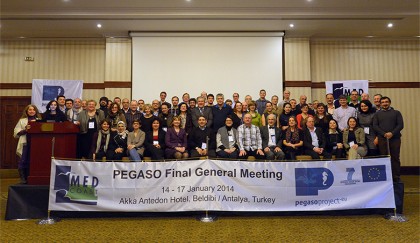
March 2014
 | March 2014 |
The four-year PEGASO project comes to an end with innovative outcomes for ICZM in the Mediterranean and Black Seas | |
|---|---|
 The final PEGASO conference took place in Antalya (Turkey) from 14 to 17 January, bringing together a wide range of institutes and networks from the Mediterranean and Black Seas and representatives of Integrated Coastal Zone Management (ICZM) initiatives in other regional seas. PEGASO is a collaborative project involving 25 partners that have worked for four years under the lead coordination of the Autonomous University of Barcelona to develop novel, shared approaches in support of integrated policies for the coastal, marine and maritime realms of the Mediterranean and Black Sea basins. The ICZM Protocol to the Barcelona Convention has been the main driver of the PEGASO project. The PEGASO community-ICZM researchers, practitioners and decision makers-have worked together to achieve the project's main outcome: a shared ICZM Governance Platform that bridges the gap between the scientific and end-user communities far more effectively than conventional methods. The governance platform has been established as a network and forum where people with a deep interest in effectively implementing ICZM can share knowledge and experience and test new planning and management tools. This kind of joint effort based on the ecosystems approach and collaborative work is known as adaptive management. According to Françoise Breton, the lead partner from the Autonomous University of Barcelona, ‘the PEGASO project has supported the implementation of the ICZM Protocol in the Mediterranean, and has contributed to the development of similar policies in the Black Sea, as well as bridging the gap between science and the decision-making process.'
Furthermore, PEGASO has established and strengthened lasting mechanisms for networking and capacity development so as to promote knowledge transfer and dissemination (N-S; S-N; N-N). Over PEGASO's lifespan, the project has mobilized about 800 Mediterranean and Black Sea stakeholders in successful collaborative work at both regional and CASE levels. PEGASO has been an innovative and creative project that has enabled stakeholders to share their knowledge with scientists in novel ways. This has led to a new attitude among decision makers and national and local managers towards exchanging data and talking to each other, with the result that these different professional spheres now work in unison.
Further information may be obtained from: Françoise Breton Photo: Participants at the final PEGASO meeting in Antalya (Turkey).
| |